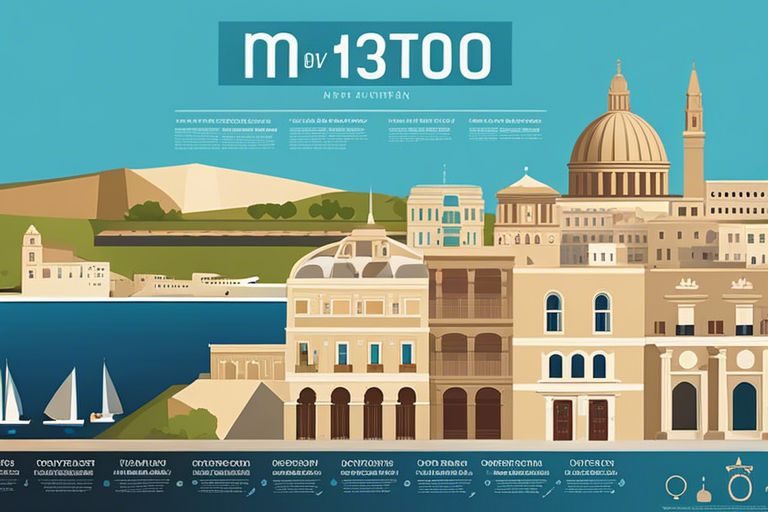Key Insights into Malta’s Economic Health

Malta, a small island nation in the Mediterranean, boasts a resilient economy that has shown remarkable growth in recent years. However, diving deeper into the economic health of the country reveals key insights that paint a more nuanced picture. From the impacts of global economic trends on its tourism industry to potential challenges arising from its exposure to external shocks, understanding these factors is crucial for stakeholders and policymakers. This blog post will explore the current state of Malta’s economy, highlighting both its strengths and vulnerabilities to provide a comprehensive overview of the economic landscape in this dynamic island nation. Stay tuned for a detailed analysis of the key indicators shaping Malta’s economic future.
Malta's GDP and Growth Patterns
Analysis of Current GDP Figures
The latest data on Malta’s GDP indicates a steady growth trajectory in recent years. The country’s GDP showed a 2.9% increase in the last fiscal quarter, reflecting a resilient economy amidst global uncertainties. The key drivers of this growth are the robust performance of the tourism sector, strong private consumption, and increased government investments in infrastructure projects.
Historical Growth Trends
An examination of Malta’s historical growth trends reveals a consistent pattern of positive expansion over the past decade. The economy has maintained an average annual growth rate of 3.5% since 2010, outperforming many other European countries. This sustained growth can be attributed to Malta’s pro-business policies, strategic location, and a skilled workforce that attracts foreign investments and boosts domestic industries.
For instance, Malta’s diversification into emerging sectors such as fintech, gaming, and biotechnology has significantly contributed to its economic resilience and long-term sustainability. The government’s focus on innovation and digital transformation has positioned Malta as a competitive player in the global market, fostering economic growth and job creation.
Employment and Labour Market Dynamics
Employment Rates and Job Creation
For Malta’s economic health, evaluating employment rates and job creation is paramount. The employment rate in Malta has been steadily increasing over the past few years, indicating a positive trend in job creation. The government’s policies and initiatives to attract foreign investment have played a crucial role in this growth. However, it is necessary to closely monitor these rates to ensure sustainable employment opportunities for the workforce.
Sectoral Employment Analysis
Labour market dynamics in Malta are largely influenced by sectoral employment trends. The services sector notably dominates the job market, with tourism, financial services, and gaming industries contributing significantly to employment. While this diversification provides stability, over-reliance on certain sectors may pose risks in times of economic downturn.
Employment diversification across sectors is crucial to mitigate the impact of any potential sectoral downturns. The government must focus on promoting innovation and skills development in emerging sectors to ensure a resilient labour market.
Government Finances and Fiscal Stability
Budget Balance and Public Debt
Once again, a critical aspect of analyzing Malta’s economic health is to evaluate the government’s budget balance and public debt. Debt levels have a direct impact on the country’s fiscal stability and ability to fund necessary services and investments. Malta’s ability to sustain a healthy budget balance while managing its public debt is crucial for long-term economic prosperity.
Impact of Fiscal Policies on Economic Health
When assessing Malta’s economic health, it is necessary to consider the Fiscal policies implemented by the government. These policies play a significant role in shaping the country’s economic landscape, influencing factors such as consumer confidence, investment levels, and overall growth. Sound fiscal policies can stimulate economic activity and ensure sustainable development.
Understanding the impact of fiscal policies on economic health provides insights into potential risks and opportunities for Malta’s economy. Striking a balance between stimulating growth and maintaining fiscal discipline is crucial for long-term stability. Monitoring key economic indicators and adjusting policies accordingly is vital to ensure a resilient and prosperous economy.
Trade and Investment Climate
Trade Balances and International Partnerships
Now, let’s research into Malta’s trade balances and international partnerships. Malta has built strong economic relationships with various countries, contributing to its trade balance. The country has shown a consistent trade surplus over the years, indicating a competitive edge in its export sector. Malta’s strategic location in the Mediterranean has also played a crucial role in facilitating trade with Europe and North Africa.
Foreign Direct Investment Flows
On the front of foreign direct investment flows, Malta has been proactive in attracting foreign investments. The country offers a favorable business environment, including tax incentives and a well-educated workforce, making it an attractive destination for investors. Malta’s FDI inflows have been steadily increasing, reflecting growing confidence in the country’s economy.
Foreign direct investment plays a significant role in Malta’s economic growth, providing capital, technology, and job opportunities for the local workforce. The government’s ongoing efforts to improve infrastructure and streamline regulations further enhance Malta’s appeal to foreign investors.
International Partnerships
International partnerships are vital for Malta’s economic diversification and growth. The country has established strong ties with the European Union, being a member state since 2004. This partnership grants Malta access to the EU’s single market, benefiting its trade and investment opportunities. Additionally, Malta has been fostering relations with other global players, expanding its reach and creating new avenues for economic collaborations.
Challenges and Opportunities
Identifying Economic Risks
Opportunities exist for Malta to address and mitigate potential economic risks. The country needs to carefully monitor external factors such as global economic downturns, political instability in key trading partners, and fluctuations in commodity prices, which could all impact Malta’s economy. By staying vigilant and adaptable, Malta can proactively respond to these risks and safeguard its economic health.
Potential for Future Economic Expansion
For Malta, there is significant potential for future economic expansion. With a strategic planning framework in place, the country can focus on key sectors like tourism, financial services, and technology to drive sustained economic growth. By investing in infrastructure development, fostering innovation, and attracting foreign investments, Malta can position itself as a competitive player in the global market, creating new opportunities for job creation and prosperity.
Conclusion
From above analysis, we can conclude that Malta has demonstrated strong economic growth, low unemployment rates, and a resilient financial sector. The country’s diversified economy, coupled with its strategic location and skilled workforce, have positioned it as a key player in the European Union. However, challenges such as income inequality and sustainability issues remain areas of concern that need to be addressed to ensure long-term economic health. Overall, Malta’s economic outlook appears positive, with continued efforts needed to sustain its growth trajectory in the coming years.
FAQs:
What factors contribute to Malta’s economic growth?
Malta’s economic growth is driven by robust performance in the tourism sector, strong private consumption, and increased government investments in infrastructure projects.
How has Malta’s GDP performed historically?
Over the past decade, Malta has maintained an average annual growth rate of 3.5%, outperforming many European countries due to its pro-business policies and strategic location.
What are the primary sectors dominating Malta’s job market?
The services sector, particularly tourism, financial services, and gaming industries, significantly contribute to employment in Malta.
What role does foreign direct investment play in Malta’s economy?
Foreign direct investment provides capital, technology, and job opportunities for Malta’s workforce, reflecting growing confidence in the country’s economy.
What are the key challenges and opportunities for Malta’s economic future?
Malta faces challenges such as income inequality and sustainability issues, but opportunities for future economic expansion lie in sectors like tourism, financial services, and technology.
Recommended Posts

Financial Aspects of Doing Business in Malta
July 26, 2024

The Rise of Digital Banking Solutions in Malta
July 24, 2024





